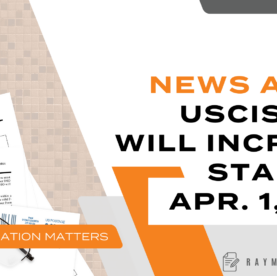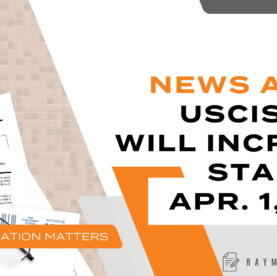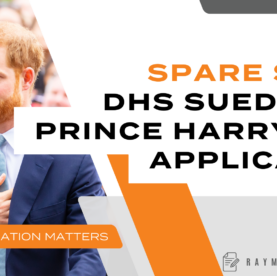Major Changes Proposed to Student Visa to Have Big Impact on International Students

The Department of Homeland Security (“DHS”) has proposed a new rule that would significantly change immigration rules for international students in the United States. The proposed rule, detailed in a 256-page document, has drawn hundreds of public comments and could draw many more by the time the comment period ends on October 26. If approved, the proposed rule will constitute the most far-reaching change in the student visa system in the last 20 years.
Changes Proposed to Student Visa
- The new rule proposes certain rules that are subject to shorter admission period of up to two or four years, following to the end date noted in the Form I-20 or DS-2019; currently, students are subject to Duration of Status (D/S)
- F-1 students who are enrolled in the English as a Second Language (“ESL”) program are limited by a lifetime study period of 24 months, including breaks
- The proposed rule allows F-1 students to enroll in programs of the same educational level for a total of three times; for example, a student enrolled in a bachelors degree program, can enroll for other bachelors degrees for a total of only three times
- F-1 students can change to lower educational level once while being in F-1 status
Duration of Status to Fixed End Date
Currently, student visas are good for the duration of status, meaning students can stay in the United States indefinitely if they remain enrolled in school. Under the proposed rule, students can stay in the United States for a period of two or four years. The proposed rule moves from the duration of the status concept to a new policy that imposes a speculated fixed end date.
The DHS stated that the two-year limit is considered to be appropriate for a subset of F and J students, due to heightened concerns of fraud, abuse, or national security. The student subject to the two-year rule are students from a country that is on the State Sponsors of Terrorism List – North Korea, Sudan, Iran, and Syria; countries with more than 10% of overstay in the United States; based on U.S. national interest; F-1 students enrolling in unaccredited schools; and students attending schools where the school or exchange program does not participate in E-verify.
If students are unable to finish their course within the designated period, they must apply for an extension of status. The only reasons to seek an extension are “compelling academic reasons, a medical condition, or a natural disaster or another major event,” the proposed rule states. The rule is criticized for being enforcement-oriented.
Students will have to apply for an extension of status Form I-539 at the end of their authorized visa date. It is feared that this will significantly increase the approval times and delay students from undergoing their residency or training period. The legal fees and the application fee for obtaining this extension are also high, an expense the students do not currently have.
The worst affected are Ph.D. students, for whom the four-year maximum stay will not be long enough. Normally Ph.D. students take five years or more for course completion. Another affected class is the J-1 exchange visa category, which includes students under training and international physicians, who are likely to be affected.
Impact on International Students
The proposed rule seems harsh on students who are struggling to complete their courses, and the rule gives discretion to the DHS as to whether to allow extensions. The rule states that “a pattern of behavior demonstrating a student is repeatedly unable or unwilling to complete his or her course of study, such as failing grades, in addition to academic probation or suspension, is an unacceptable reason for program extensions.” The DHS claims that the new rule will weed out students who have been in the United States for long periods of time and to the students who have struggled to complete the course.
To learn more about this blog post or if you have any other immigration concerns, please feel free to contact me at rglahoud@norris-law.com or (484) 544-0022.





